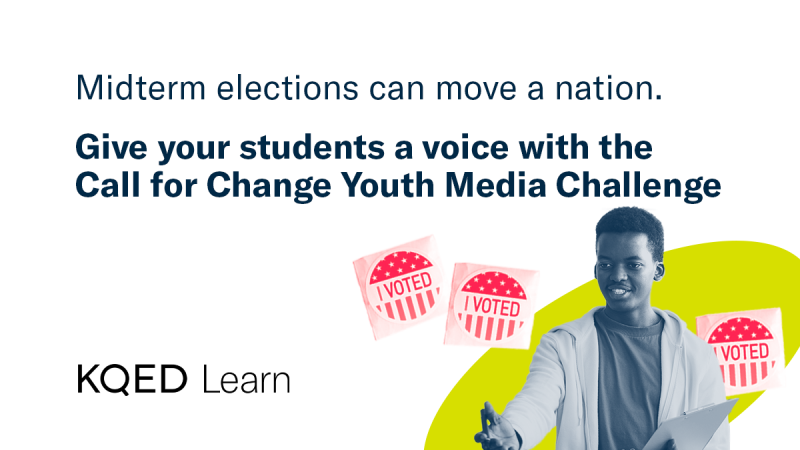From climate change to mental health, an increasing number of youth are taking their place as advocates for a better future. Although most school-age students are not able to vote, they are utilizing powerful tools to make their voices heard, through community involvement, protests, social media, and more.
KQED Youth Media Challenges give a home to these student voices. Ready to use, standards-based curriculum guides students to research and form their perspectives. Then they can publish their pieces on the Youth Media Showcase, a platform that elevates their voices to an authentic audience. You can find thousands of middle & high school voices on the Showcase calling for changes in everything from local community issues to global issues.
Their Future, Their Voices
With midterm elections approaching soon, educators in all subject areas are using the Call for Change Youth Media Challenge to engage student voices in the classroom around topics that matter to them. You can grab the free classroom curriculum here.
Below, we have gathered a sampling of unique student takes on big topic issues.
Calls for Education Reform
- Banned Books Jade views censorship as “the blindfold that dangerously guards people from reality” and encourages school officials to go against this trend.
- Pay Teachers More Shrutik believes proper compensation for teachers should be an essential part of every school districts’ budget.
- Funds for Extracurriculars Presley makes the case that extracurriculars can help students’ mental health and academic performance.
- A More Diverse Curriculum Ruby calls for culturally relevant curriculum in schools that reflects the histories of people of all genders, races, and sexualities.
- Unaffordable Education Katherine wants government policies that hold colleges accountable for rising tuition costs.
Calls for Climate Preservation
- Water Conservation in CA Casey wants commercial industries and corporations to be held accountable for their water waste.
- Recycling for a New Future Tiffany was surprised to find that her school district did not have a required recycling program.
- Overfishing in the Oceans Tanay warns about the impact of overfishing on the biodiversity of our oceans.
Call for Social Change
- Reparations for Black Americans Adiyah believes reparations are key to addressing the racial wealth gap in the United States.
- Overpriced Medication Jenna asks for government policies which regulate the cost of essential, life-saving drugs like insulin.
- Imperfectly Perfect Zahra wants to live in a society that normalizes and celebrates different body types, rather than pressuring people into one ideal physique.
- The Cost of Fast Fashion Audrey’s political cartoon brings attention to the behind-the-scenes impact of excessive shopping habits in America.
- Animal Testing Gracie advocates for more policies that protect animal rights.
Calls for Mental Health Care
- Mental illness in youth Anya focuses on the need to normalize getting help for mental illness and increasing availability of resources.
- Latino Community and Mental Health Mayra wants to raise awareness about the importance of mental health in the Lation community.
- How Gen-Z Romanticizes Mental Health on Social Media Sheyla looks at how the casual use of labels like “OCD” or “panic attack” can trivialize the experience of those who experience these medical conditions.
- The Daily Lie Connie’s political cartoon shows the burdens teens carry and the impact of pretending they are doing fine.
You can find more student perspectives on the Youth Media Showcase. Try using the search option to filter for areas of interest to you and your students!
